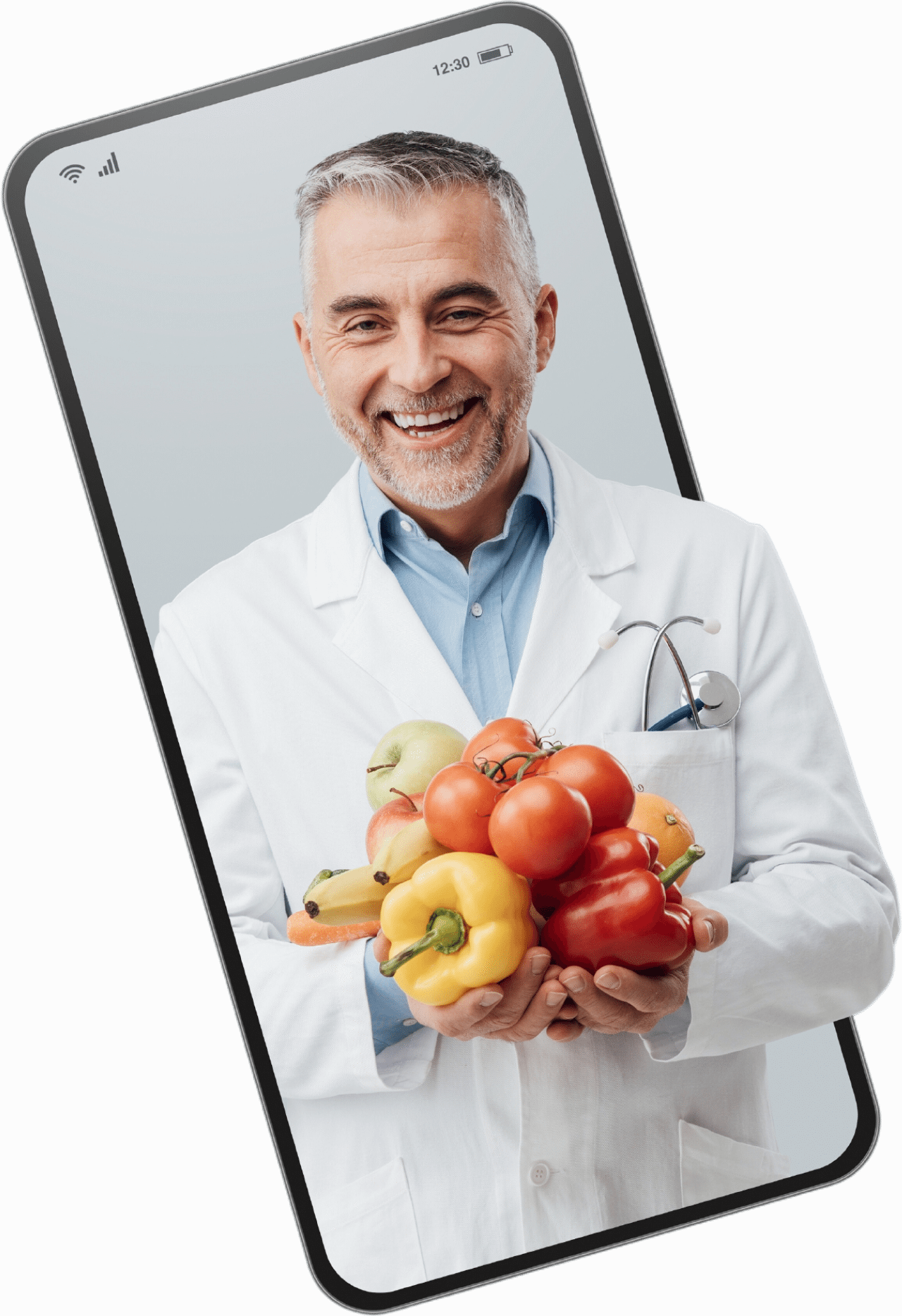CANCER DIET PLAN FROM
Best Cancer Nutritionists

Contact Us
Maintaining a healthy, balanced diet can play a role in preventing specific cancers and decreasing the likelihood of others. Nutritionists and dietitians play a crucial role in preventing and managing diseases like cancer. The nutrition goals for cancer therapy are determined by the person’s specific cancer type, stage, and any other medical conditions. Consuming adequate protein and calories is crucial for healing, battling infections, and maintaining sufficient energy levels.

What Is the Role of an Oncology Dietitian?
A dietitian specializing in oncology assists cancer patients and their families in creating a radiation diet plan. Oncology nutritionists guide patients in adjusting their diet to improve health and reduce cancer- and treatment-related side effects.
Once they have obtained more information, the oncology dietitian will create a nutrition plan with specific goals related to food. The plan will likely include a mix of fruits, veggies, and lean proteins. On the other hand, it might include surprising things like gravy or milkshakes.
The meal plan provides individualized goals related to food for the patient. If you lost a significant amount of weight during chemotherapy, for example, you may want to aim for a 20-pound gain. Our oncology dietitian might suggest calorie and protein targets to help you gain body mass. A dietitian for cancer may provide practical advice on achieving nutritional needs, managing weight loss, fatigue, and nausea due to illness or treatment side effects, personalised guidelines based on biological needs, family or caregiver support plans, and recipes, food lists, and dietary supplements.
Common Nutrition Challenges Faced by Oncology Patients
Everyone has issues when it comes to eating a well-balanced diet. Yet many cancer patients experience side effects from their treatments or symptoms associated with their illness that make it difficult for them to eat healthily.
The following are a few nutrition challenges that oncology patients often encounter.
- Not Feeling Hungry
Cancer can change how your body processes food for energy. Your desire for food could be affected as a result. Your cancer nutritionist may recommend having five to six small meals a day. You can maintain your eating and drinking pattern by setting reminders on your phone. Keeping snacks close at hand on your nightstand guarantees that you’ll always have food on hand. You can improve your overall satisfaction and well-being by arranging the table, playing music, and having meals with loved ones to create a good mealtime experience.
- Feeling Hungrier Than Usual
However, there are patients who are always craving food. While food is essential for sustaining strength and energy, overeating can lead to unnecessary weight gain. An oncology nutritionist may suggest controlling appetite by reducing high-calorie foods, incorporating fibre-rich options such as fruits, veggies, and whole grains, including lean proteins in every meal, and hydrating with tea, decaf coffee, or lemon-infused water between meals.
- Nausea & Vomiting
Nausea and vomiting are common side effects of chemotherapy for most patients. Patients who receive radiation to the brain, gastrointestinal tract, and liver often experience these uncomfortable side effects. If you’re feeling under the weather, an oncology dietitian can assist in devising a diet plan with more easily digestible foods.
- Constipation
Patients undergoing cancer treatment frequently experience constipation. Decreased water consumption and inactivity can sometimes cause backups. Chemotherapy drugs are responsible in some instances. To relieve constipation, an oncology dietitian may recommend consuming high-fibre foods such as whole grains, fruits, vegetables, and nuts, drinking prune or apple juice, monitoring fluid intake, and consuming hot beverages like tea and decaf coffee.
- Diarrhea
Radiation treatment in the abdomen or pelvic region can lead to a separate problem: diarrhea. While constipation and diarrhea pose risks, loose stools can rapidly dehydrate oncology patients.
- Fatigue
All cancer treatments commonly cause fatigue as a side effect. Although tiredness doesn’t directly influence hunger, it does compromise a patient’s capacity to cook healthy food.
- Dry Mouth
During chemotherapy or radiation therapy, you might observe dry mouth symptoms like excessive thirst or thick saliva. Your oncology dietitian may recommend various strategies to combat dry mouth. Avoid alcohol and excessive caffeinated drinks as they can worsen dryness. Sugar-free gum can increase saliva production when you’re not eating. To avoid dry mouth, add lemon or lime to your water or salad dressings. Furthermore, keeping track of how much water you drink ensures you stay properly hydrated. Use these simple yet powerful

Why Is Nutrition Important During Cancer Treatment?
Good nutrition is essential for individuals with cancer, as both the illness and treatments can greatly affect their eating habits. Moreover, they have the potential to affect your body’s nutrient processing and food tolerance.
To endure the effects of cancer treatment, adjusting your diet may be necessary for strength-building. It may involve consuming unconventional foods when you’re in a state of good health. If you’re struggling to eat due to mouth sores, you may require high-protein, high-calorie foods or cool treats like ice cream. When determining the best ways to meet your body’s nutritional needs, it’s important to take into account the specific cancer type, treatment, and side effects.
Patients with cancer require unique nutritional needs, which can be addressed by a dietitian who can establish goals and develop customized plans. A healthy diet, when combined with cancer therapy, can enhance immune response, body weight, nutrient reserves, resilience, vigour, and overall well-being. Additionally, it can speed up healing. In order to fight cancer effectively, the body requires a mix of meals containing proteins, fats, carbs, water, vitamins, and minerals.
What To Expect During Your First Consultation
During the first visit, the oncology nutritionist will perform a medical examination to look for physical indicators of nutritional imbalance, such as weight loss, thinning hair, and weak nails. They will inquire about the patient’s diet, asking about daily meals, frequency, and intake of high-sugar drinks. Additionally, they will assess any side effects, symptoms, preferred foods, and cravings experienced during sickness. The objective is to determine the patient’s initial diet and track any adjustments during treatment while addressing nutrition-related side effects.
Before the consultation, patients should make a list of all the medications, vitamins, and supplements they are taking; take pictures of their bottles; record any adverse effects; keep a food journal for a minimum of one week, and ask any queries they may have. The dietitian encourages patients to actively manage their health and nutrition, being mindful of any possible diet imbalances.
Developing a Nutrition Plan With Your Oncology Dietitian
To create a nutritional guide for cancer patients, one must strike a balance between nutrient-dense foods and comforting options. The majority of your diet should be made up of nutrient-dense foods like whole grains, lean protein, healthy fats, vegetables, and fruits. Nevertheless, comfort foods continue to offer nourishment and happiness. Cancer patients may find oncology dietitians scary because they fear they will be judged or advised to give up their favourite foods. However, cancer patients might receive support and encouragement on their food decisions from oncology nutritionists. No foods are off-limits during treatment as the body requires more energy. Including enjoyable foods in the diet can provide extra nourishment and help patients successfully finish treatment as planned.
Our Top Cancer Nutritionists
Contact Our Best Cancer Nutritionists
FAQ
Q: Do you provide diet plans based on cancer type?
A: Yes, at Qua Nutrition, we offer customized meal plans tailored to the specific type and stage of cancer, treatment protocol, and individual nutritional needs.
Q: Do you work with patients undergoing chemotherapy or radiation?
A: Yes, we work closely with individuals undergoing chemotherapy, radiation, surgery, or immunotherapy to provide nutritional support throughout the treatment journey.
Q: Do you offer virtual consultations for cancer nutrition?
A: Yes, we provide both online and in-clinic consultations, making it convenient for patients to receive expert guidance from the comfort of their homes.
Q: How can I book an appointment with a cancer nutritionist at Qua Nutrition?
A: You can schedule an appointment through our official website, call our helpline, or visit the nearest Qua Nutrition clinic for personalized assistance.













